WASHINGTON — The Atlantic published an opinion piece today that criticizes the ongoing War on Porn campaign and its attempts to shut down legal adult content on the internet.
Penned by staff writer Olga Khazan, the opinion piece concluded that although “porn makes for an easy target” for politicians and the professional moralists who lobby them, “legislators focused on labeling it as a 'public health crisis' should consider what problems they are actually trying to solve."
“Many researchers and adult entertainment workers support measures that would reduce kids’ access to porn, ensure that porn videos portray only consenting adults and mandate fair wages for sex workers,” wrote Khazan. “Calling adults’ legal use of pornography a ‘public health crisis’ doesn’t do any of that.”
The Atlantic piece mentions copycat bills distributed by anti-porn lobbyists to likeminded state legislators and efforts to mandate “porn filters.”
The article also correctly identifies the National Center on Sexual Exploitation (NCOSE, formerly Morality in Media) as “an anti-obscenity nonprofit that produced model legislation for the porn-blocking bill and the public-health-crisis bills.”
As XBIZ reported in January, activists waging the New War on Porn routinely declare that adult content is not free expression protected by the First Amendment in the U.S. and by long-standing traditions of freedom of speech in other lands. It is "a public health crisis," a "drug" and "slavery," using language and notions developed for years — in some cases decades — in well-funded, religiously-motivated think tanks and lobbies. These groups literally have an agenda: to shut down, by whatever means necessary, online porn.
Khazan also spoke to Arizona state Representative Michelle Udall, who admitted she introduced her state’s public-health-crisis bill in 2019 "after hearing from constituents involved with the anti-porn group Fight the New Drug, and that NCOSE gave her a booklet with data and studies on porn."
To read the article, titled “The Porn Crisis That Isn’t,” visit TheAtlantic.com.






